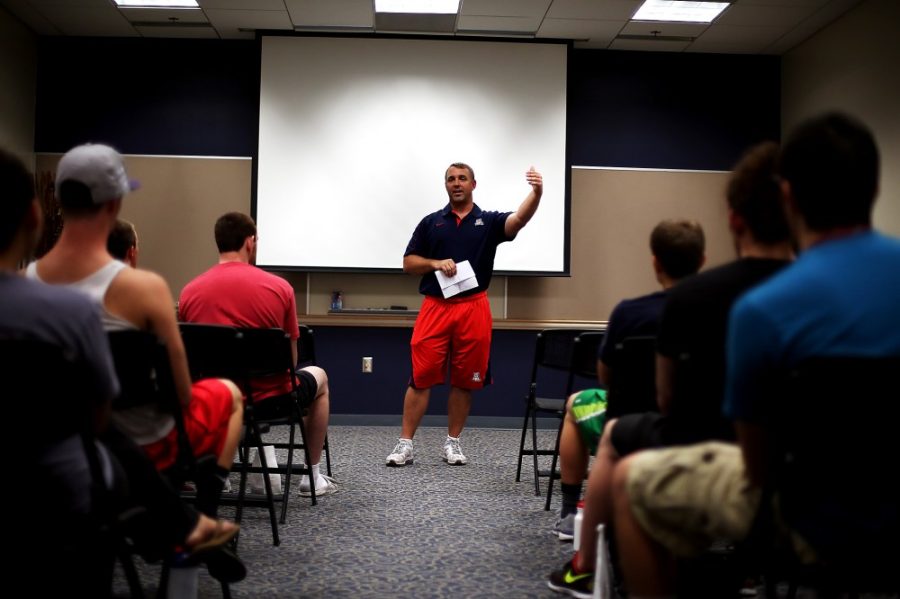The Student Health Advocacy Committee hosted the first of a three-part lecture series at the Student Recreation Center on Thursday.
The lecture, titled “Jacked in a Box,” featured Director of Olympic Sports Jim Krumpos, who spoke about the effects of using muscle supplements, different workout goals of students and the importance of nutrition in reaching workout goals.
The lecture series was designed to raise awareness of topics relevant to college students, according to Stephanie Kha, director of SHAC.
“A lot of the talks given around campus don’t always relate to things students do every day,” Kha said. “The purpose is to get the word out for relevant health topics. The other reason is to promote local, university-affiliated professionals who are experts in their fields.”
Krumpos, who has been training athletes for almost 14 years, focused on muscle supplements, how they affect the body, and how they are used positively and negatively.
He also addressed how many students use supplements excessively, and how they may harm the body and slow down efforts to reach a workout goal.
According to Krumpos, excessive use comes with noticeable disruptions in the body.
“You might not be able to sleep at night, focus on what you’re doing, or have heart palpitation,” Krumpos said. “You don’t want fake energy, you should have energy because your body is full of the right stuff. You can have fake energy and you end up getting hurt.”
Risks that come with muscle supplements may very from person to person, from digestive issues to injuries from not staying hydrated enough.
Although students should be aware of what the risks are, not all supplements are harmful, he said, such as fish oils, post-workout shakes and antioxidants.
Along with nutrition and supplements, Krumpos also spoke about overtraining, which happens when athletes workout obsessively to the point where is becomes counterproductive.
“Most people are probably overtraining,” he said. “If you can’t fall asleep, that’s a sign of overtraining. Mood swing issues, depression, or the loss of enthusiasm to work out can be other signs.”
In general, for every 12 weeks of training, students should take five days off, as well as get enough sleep and eat right.
“The number one thing is if you’re not sleeping eight hours a night and eating right, you’re wasting money on supplement pills,” Krumpos said.
Members of the Physical Health Committee of SHAC said they thought the event had both a good turnout and atmosphere.
“I think it went really well, a lot of people showed up and he [Krumpos] addressed everyone’s questions,” said Zabe Shafi, executive chair of the committee.
The event also attracted a variety of students from different majors.
“I came to hear about what’s a good contributor to my overall health while trying to balance college life,” said Andrew Wojtanowski, a physiology senior. “I left feeling better with what I can do at the gym and what I can do with my body.”
Kimberly Molina, a nutritional sciences junior, said she attended the event because she wanted to know more about supplements.
“I take supplements and train every day,” Molina said, “so I thought it was beneficial information.”
The second lecture of the series titled, “The Skinny on Diet Pills,” will take place on Oct. 24.









